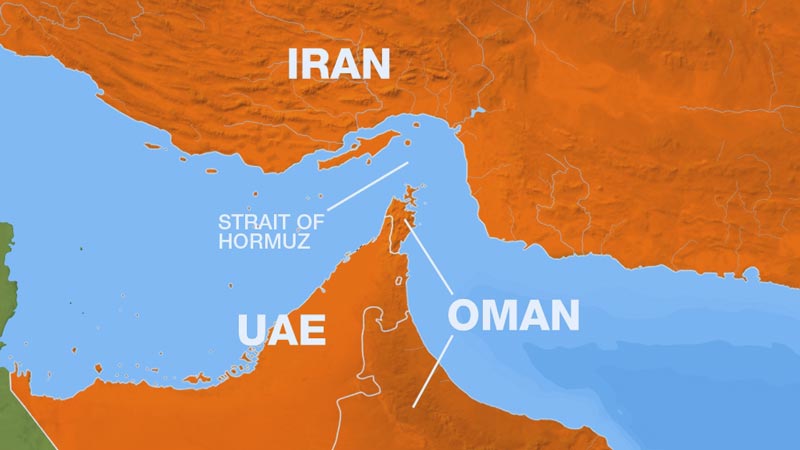Iran releases video of British flagged oil tanker’s capture
5 min read
Geneva/London – United Kingdom of Great Britain and Northern Ireland suspect the Iranian seizure of a British-flagged tanker within the Gulf as a “hostile act” on Saturday, denying Tehran’s statement that it had confiscated the ship as a result of it had been enclosed in Associate in Nursing accident.
Iran’s Revolutionary Guards posted a video online explaining speedboats picking up alongside the Stena Impero tanker, its title certainly evident.
Troops exploitation ski masks and mercantilism machine guns rappelled to its deck from a heavier-than-air craft, the identical ways adopted by British Royal Marines to seize Associate in Nursing Iranian tanker off the beach of colony time period agone.
Friday’s performance in the global oil trade’s most famous waterway has been seen in the West as a major increase after three months of meeting that has previously taken Iran and the United States to the edge of war.
It happens weeks of threats from Tehran to revenge for Britain’s capture of the Iranian tanker Grace 1, involved in violating sanctions on Syria.
British protection Secretary Penny Mordaunt called the event a “hostile act”. Foreign Secretary Jeremy Hunt said he had displayed “extreme distress” by the receiver to his Iranian counterpart, Mohammad Javad Zarif. Britain also asked the Iranian charge d’affaires in London.
Iran’s Fars news company said the Guardians had taken charge of the Stena Impero on Friday after it failed with an Iranian fishing boat whose distress call is ignored.
The vessel, taking no cargo, was brought to the Iranian port of Bandar Abbas. It would stop there with its 23 crew — 18 of them Indians — while the accident was examined, Iranian news companies quoted the head of Ports and Maritime Organisation in south Hormozgan province, Allahmorad Afifipour, as maintaining.
The sound, between Iran and the Arabian peninsula, is the single outlet for shipping of most Middle Eastern oil, and the seizing sent oil prices higher. The United States, which toughened sanctions against Iran in May planning to reduce its oil shipping altogether, has been preparing for months of an Iranian warning to shipping in the strait.
Another oil tanker, the Masdar, was also covered by Iranian personnel on Friday and momentarily forced to divert towards Iran, but later was released to proceed on its route through the strait.
France, Germany and the European Union followed Britain in denouncing the seizure.
The 3 huge European nations are signatories to a 2015 nuclear deal among national capital and world powers that Washington undermined by deed last year, setting Iran’s antecedent delicate relations with the West on a downward spiral.
Under the pact, Iran allowed reducing nuclear work in return for lifting injunctions. The European countries rejected the Trump administration’s option to abandon the contract last year, however have up to now didn’t fulfill obligations to Islamic Republic of Iran of giving different suggests that for it to enter world trade.
“Just spoke to Zarif and showed dangerous distress that having certain me last Saturday Iran needed to de-escalate the condition, they have controlled otherwise,” tweeted British Support Foreign Secretary Hunt. “This has to be about things, not arguments if we are to find a way through.”
Earlier he said London’s reaction would be “recognized but robust”, and it would secure the protection of its shipping.
On Friday, hunt aforesaid the solution would be found via diplomacy and London was “not seeing at military choices.” Britain’s government aforesaid it had wise British shipping to go to out of the Hormuz region for Associate in Nursing interim amount.
The past three months of growth have viewed the United States and Iran comes as close as always to direct protected conflict. In June, Tehran shot down a U.S. drone and Trump directed retaliatory airstrikes, only to ask them off just minutes before impact.
In New Delhi, India’s international ministry said it was actively investigating the release of its citizens among the crew.
Director Stena Bulk said on Friday the tanker had been “in full agreement with all shipping and global regulations”. On Saturday it said it was requesting to visit the crew.
The vessel had been going to a port in Saudi Arabia and abruptly changed course after moving through the strait.
The United States has accused Iran of a range of attacks on shipping around the Strait of Hormuz. Tehran denies the allegations. Washington also said it had this week hit an Iranian drone near wherever the Stena Impero was seized.
The United States is giving military personnel and support to Saudi Arabia for the first time since the U.S. attack of Iraq in 2003.
Frequently Asked Questions
Iran sanctions are measures taken by governments, organizations, or individuals to punish or restrict Iran for its actions, often related to its nuclear program or support for terrorism. These measures can include economic sanctions (such as trade restrictions or asset freezes), diplomatic measures (such as expulsion of diplomats), and military actions.
What are Iran sanctions? Iran sanctions are measures taken by governments, organizations, or individuals to punish or restrict Iran for its actions, often related to its nuclear program or support for terrorism. These measures can include economic sanctions (such as trade restrictions or asset freezes), diplomatic measures (such as expulsion of diplomats), and military actions.
The goals of Iran sanctions vary depending on the specific measures being taken, but they may include efforts to pressure Iran to change its behavior (such as halting its nuclear program or supporting terrorism), to punish Iran for its actions, or to isolate it diplomatically.
Iran sanctions can have a significant impact on the lives of ordinary Iranians, as they can restrict access to goods, technology, and financial resources. This can make it difficult for people to access basic necessities such as food, medicine, and fuel, and can also make it harder for businesses to operate.
Yes, Iran sanctions can be lifted if the parties imposing them decide to do so. This can happen if Iran agrees to meet certain conditions, such as dismantling its nuclear program or ceasing support for terrorism, or if the parties decide that the sanctions are no longer necessary or effective.







